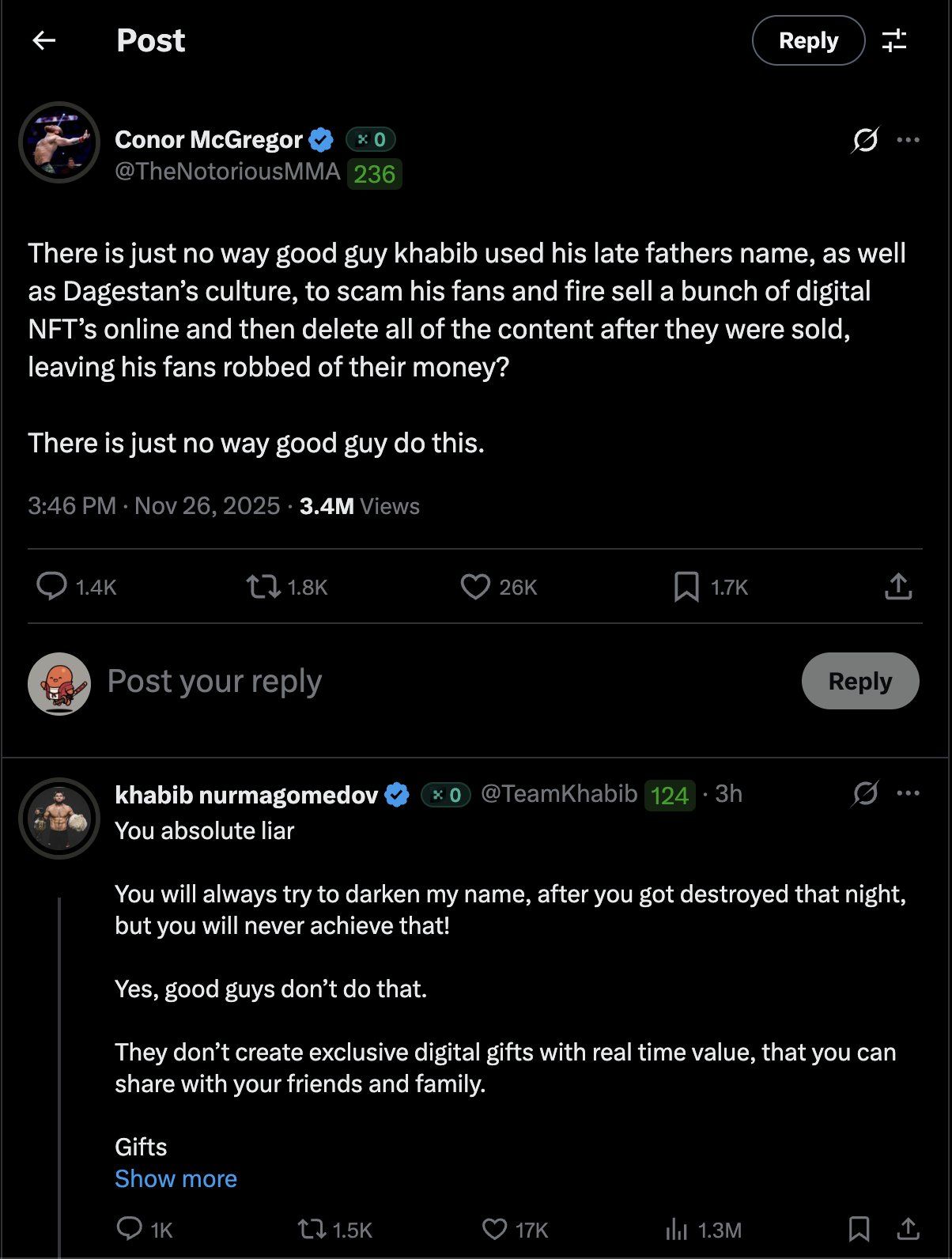Conor McGregor and Khabib’s UFC Rivalry Erupts Again After NFT ‘Scam’ Accusation
Conor McGregor reignited his rivalry with Khabib by calling his NFT drop a scam, prompting Khabib’s denial and a sharp backlash led by investigator ZachXBT.
Conor McGregor and Khabib Nurmagomedov’s rivalry has returned to the spotlight, this time dominating Crypto Twitter after McGregor accused Khabib’s new Telegram-based NFT collection of scamming fans.
The claim triggered a swift response from Khabib and a sharp intervention from on-chain investigator ZachXBT, who redirected attention toward McGregor’s own controversial token launch.
Crypto Feud Ignites After Khabib’s NFT Launch
Khabib promoted a new digital collectibles drop on Telegram this week, themed around the Dagestani papakha hat he wore during UFC walkouts.
The collection sold out quickly, generating about $4.4 million in a single day.
 The Now-Deleted Tweet From Conor McGregor
The Now-Deleted Tweet From Conor McGregor
The former UFC champion framed the NFTs as cultural digital gifts rather than speculative assets. He highlighted their link to Dagestani tradition and presented them as shareable items within Telegram’s ecosystem.
However, McGregor publicly rejected that narrative. He accused Khabib of running a “multi-million-dollar scam,” alleging that promotional posts were deleted after the sale.
His comments triggered immediate backlash from both MMA and crypto communities.
Can anybody find me a single person who bought the Khabib NFT who is claiming they have been scammed?Can anyone show me a single shred of evidence of Khabib misrepresenting what he was selling?The answer to both those questions are no. We get it you guys hate Muslims
— MMA Joey (@MMAJOEYC) November 26, 2025
McGregor Escalates Long-Running Rivalry
McGregor’s post revived the bitter rivalry born from UFC 229, where Khabib defeated him in 2018. The pair have exchanged barbs for years, often referencing family, legacy, and national pride.
This time, McGregor suggested Khabib used his father’s legacy and Dagestani cultural symbols to mislead fans. His message framed the drop as a “cash grab” disguised as heritage.
The accusation spread quickly, drawing strong reactions across social media.
Khabib responded within hours. He called McGregor an “absolute liar” and accused him of trying to “darken my name” since the UFC 229 loss.
He reiterated that the NFTs are cultural gifts and denied any wrongdoing.
ZachXBT’s Intervention Shifts the Narrative
The feud escalated further when on-chain investigator ZachXBT entered the conversation. He reposted McGregor’s comments but flipped the accusation back onto him.
There is just no way good guy McGregor used his reputation, as well as Irish culture, to scam his fans and fire sell a bunch of digital tokens’s online and then delete all of the posts after they were sold, leaving his fans robbed of their money? There is just no way good guy…
— ZachXBT (@zachxbt) November 26, 2025
ZachXBT pointed to McGregor’s failed REAL token earlier this year. The coin raised far less than its public target, fell sharply in price, and lost community support within weeks.
McGregor then deleted most promotional posts, leaving the project abandoned and investors frustrated.
Crypto Twitter quickly framed this as hypocrisy. Many noted that McGregor’s own token showed more red flags than Khabib’s Telegram collectibles.
After the backlash intensified, McGregor deleted his “scam” posts about Khabib.
Despite the allegations, no reports indicate that buyers lost access to their NFTs. The items still function as digital gifts inside Telegram, with no broken utilities or frozen assets.
Khabib has not marketed the drop as a financial investment.
Disclaimer: The content of this article solely reflects the author's opinion and does not represent the platform in any capacity. This article is not intended to serve as a reference for making investment decisions.
You may also like
Bitcoin Updates: IMF Warns of Widespread Risks Amid Growing Popularity of Tokenized Finance
- IMF highlights tokenized finance's efficiency gains but warns of systemic risks like smart contract interdependencies and liquidity vulnerabilities. - Upcoming Chainlink ETFs signal growing institutional adoption, with Grayscale and Bitwise advancing regulated exposure to $100B+ oracle network assets. - Analysts predict over 100 new crypto ETFs in six months, but XRP's 18% price drop underscores market volatility despite regulatory approvals. - IMF anticipates regulatory frameworks to address cross-platf

South Korea's Revamped AML Framework: Is It Possible to Balance Security with Innovation?
- South Korea's FSC overhauls AML rules to tighten crypto transaction oversight, targeting transfers under $680 and expanding pre-emptive freezes. - The crackdown follows Upbit's $30M hack linked to North Korea, prompting tax authority raids and blockchain tracking for evasion cases. - AI-powered monitoring flagged 200 suspicious accounts in 2 months, balancing automation with manual audits to detect illicit patterns. - Global enforcement remains fragmented as South Korea pushes stricter VASP registration,

"Privacy or Compliance: The Trust Challenge for Crypto in Payments and DeFi"
- Economist Saifedean Ammous critiques crypto privacy tools like Houdini Pay, arguing centralized compliance models undermine true cryptographic anonymity. - Houdini Pay's "compliant privacy" retains metadata (wallets, IPs) despite hiding onchain addresses, contrasting with zero-knowledge solutions like zkBob. - Balancer's $116M 2025 hack exposed vulnerabilities in audited DeFi protocols, highlighting risks in complex financial primitives like stable pools. - The crypto industry faces a trust dilemma: bala

